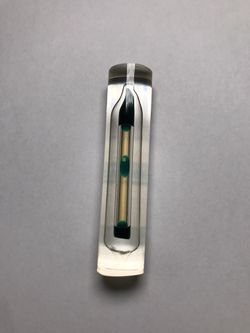Dinitrogen trioxide
 N2O3 droplets in glass ampoule
| |
| Names | |
|---|---|
| IUPAC name
Dinitrogen trioxide
| |
| Preferred IUPAC name
Dinitrogen trioxide | |
| Other names
N-oxonitramide
Nitrogen sesquioxide Nitrous anhydride | |
| Identifiers | |
| Jmol-3D images | Image |
| |
| Properties | |
| N2O3 | |
| Molar mass | 76.01 g/mol |
| Appearance | Deep blue gas |
| Odor | Stinging, unpleasant |
| Density | 1.447 g/cm3 (liquid) 1.783 g/cm3 (gas) |
| Melting point | −100.7 °C (−149.3 °F; 172.5 K) |
| Boiling point | 3.5 °C (38.3 °F; 276.6 K) (dissociates) |
| Reacts | |
| Solubility | Reacts with alcohols Soluble in CCl4, chloroform, diethyl ether, sulfuryl chloride, liq. xenon |
| Thermochemistry | |
| Std molar
entropy (S |
314.63 J·K-1·mol-1 |
| Std enthalpy of
formation (ΔfH |
91.20 kJ/mol |
| Hazards | |
| Safety data sheet | None |
| Flash point | Non-flammable |
| Related compounds | |
| Related compounds
|
Nitrous oxide Nitric oxide Nitrogen dioxide Dinitrogen tetroxide Dinitrogen pentoxide |
| Except where otherwise noted, data are given for materials in their standard state (at 25 °C [77 °F], 100 kPa). | |
| Infobox references | |
Dinitrogen trioxide is a chemical compound with the chemical formula N2O3.
Contents
[hide]Properties
Chemical
It is the anhydride of the unstable nitrous acid (HNO2) and produces it when mixed into water.
- N2O3 + 2 H2O → 2 HNO2
If the nitrous acid is not then used up quickly, it decomposes into nitric oxide and nitric acid. Nitrite salts are sometimes produced by adding N2O3 to alkaline solutions:
- N2O3 + 2 NaOH → 2 NaNO2 + H2O
Physical
Dinitrogen trioxide is a blue gas, with a strong odor.
Availability
This compound is not sold and has to be made in situ.
Preparation
Can be prepared by mixing equal parts of nitric oxide and nitrogen dioxide and cooling the mixture below -21 °C. Toluene can be used as solvent. Yield is given as 94.4 %.[1]
- NO + NO2 ⇌ N2O3
Both gasses can be obtained by dissolving copper in conc. nitric acid.
An older route involves the oxidation of nitric oxide with pure oxygen, in neat, at -54 °C.[2]
- 2 NO + ½ O2 ⇌ N2O3
Dinitrogen trioxide is only isolable at low temperatures, i.e. in the liquid and solid phases. At higher temperatures the equilibrium favors the constituent gases, with Kdiss = 193 kPa (25 °C).
Projects
- Make very pure nitrous acid
- Make nitrites
- Compound collecting
Handling
Safety
Dinitrogen trioxide is toxic and corrosive.
Storage
Can only be kept at very low temperatures, but not for long.
Disposal
Can be neutralized by bubbling it in alkaline water.
Gallery
References
- Jump up ↑ Berl, E.; Winnacker, K.; Z. Anorg. Chem.; vol. 212; (1933); p. 123
- Jump up ↑ Birhans, F.; Comptes Rendus Hebdomadaires des Seances de l'Academie des Sciences; vol. 109; (1889); p. 63
Relevant Sciencemadness threads
- Chemical pages without CAS Registry Number
- Articles without EBI source
- Chemical pages without ChemSpiderID
- Chemical pages without DrugBank identifier
- Articles without KEGG source
- Articles without InChI source
- Articles without UNII source
- Articles containing unverified chemical infoboxes
- Chemical compounds
- Inorganic compounds
- Nitrogen compounds
- Oxides
- Nitrogen oxides
- Oxidizing agents
- Gases
- Materials that react with water
